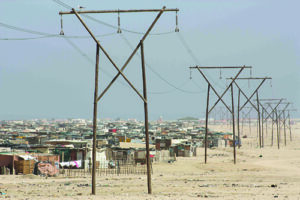
By: Josefina Lukas
Deputy Minister of Mines and Energy, Kornelia Shilunga says that universal access to electricity is a dream for every country, however, achieving it takes a long process when faced with a limited budget.
Shilunga made these remarks on Wednesday during the announcement of the newly appointed board for the Electricity Control Board (ECB) of Namibia, which will be effective from today until 7 August 2027.
“We are also dreaming towards universal access but universal access cannot be reached within a year or two. It’s a process that goes step by step and goes gradually depending on the policies and on the resources that we have as a country,” Shilunga explained.
She added that, “Every year, the government and the Ministry of Mines and Energy specifically, budget for electrification and we act according to that budget and the policies that were put in place.”
The Ministry received an allocation of N$54 million in the current financial year. With this allocation, the Ministry stated that it plans to electrify about 78 rural public institutions such as schools, clinics, and at least 180 households
Shilunga also stated that the National Integrated Resource Plan, which is a 20-year plan, is also essential in determining the right resources that can be used for electrification.
“The National Integrated Resource Plan is also looking at the mix of resources that we have in the country where we can drive electricity for our nation and in that we have a mix of resources; be it conversional, solar, wind, biomass and other sources of energy,” she said.
On the continuous rise of fuel prices, the deputy Minister said the local market was at the mercy of what is happening in the global world and OPEC+ countries.
“There are so many factors that determine the increase and decrease of oil prices, we are members of the global village and what is being said today is perhaps said according to the current situation.
“We will not be able to say we are going to increase or decrease even if OPEC+ is going to cut. The situation is going to be determined by the development that continuously happens and we will do our normal price review according to what is happening in the world and what is coming from OPEC+,” she added.
Asked on whether Namibia has been updated on any progress regarding Inga Dam, Shilunga stated that the country has been excluded from some Inga discussions, however, they are looking forward to benefiting from Inga Dam in the future.
The construction of the billion-dollar dam was meant to avert the looming power deficit in the Southern African Development Community (SADC).
“We have started that discussion, at one point some long years ago we went to a certain level where we thought we would be able to benefit from Inga Dam but eventually we realised that some discussions have excluded us as Namibia and other countries that were also to benefit they also have not benefited up to now,” Shilunga said.
The Inga dams are located in western Democratic Republic of the Congo, 50 km upstream of the mouth of the Congo River, and 225 km (140 miles) south west of Kinshasa on the Congo River.









Comments